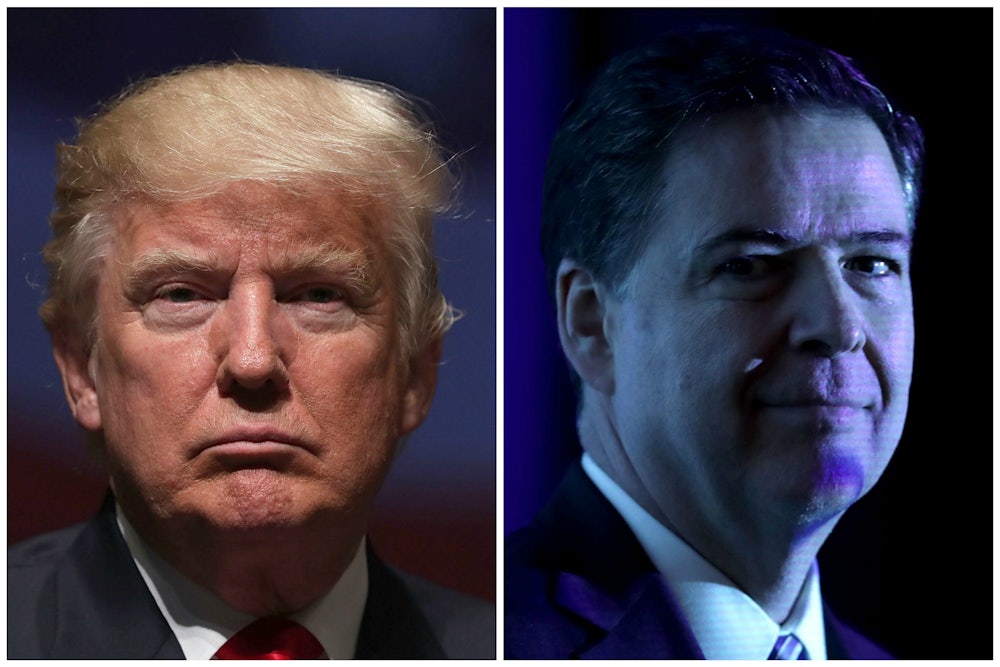Less than a month ago, President Donald Trump told Fox Business Network it wasn’t “too late” for him to fire FBI Director James Comey. At the time, I argued that while Trump was correct in a narrow, legalistic sense, “for all practical purposes it is almost certainly false—unless the White House believes that mass FBI resignations, or the appointment of a special prosecutor, or impeachment for obstruction, or some combination thereof, would be an improvement on the status quo.”
That thesis is about to be tested in dramatic fashion, because on Tuesday, Trump took the plunge and fired Comey without warning for allegedly mishandling the investigation into Hillary Clinton’s private email server. We are not yet facing a crisis of presidential legitimacy, but we are on the precipice of one that could be as bad as or worse than any in U.S. history.
No FBI director can or should be considered unfireable. FBI directors are just as capable of negligence, ethical breaches, and crimes as other public servants, if not more so. Comey painted so far outside the lines during the presidential election that the notion that he could or should be fired has crossed many minds over the past several months.
But most FBI directors don’t find themselves leading investigations of the presidents who have the authority to fire them, or serve under attorneys general who have recused themselves from those investigations. Jeff Sessions, Trump’s attorney general, reportedly helped to engineer this firing.
Likewise, there is no precedent for a president terminating an FBI director under nakedly false pretenses. Last year, Trump celebrated Comey’s campaign-season intrusions against Clinton as “bigger than Watergate,” and he may owe his presidency to those intrusions. That Trump now believes those intrusions were so improper as to warrant Comey’s scalp fails the most basic test of good faith.
Trump wanted Comey gone, so he latched on to a reason. Our best hope is that Trump reached this decision because he is erratic and knavish, rather than because he is placing himself above the reach of the law.
On the off-chance Trump’s decision to fire Comey is not a calamitously ham-fisted attempt to obstruct the Russia-Trump investigation, a few of the following things need to happen very quickly.
First, and most critically, Deputy Attorney General Rod Rosenstein can appoint a special prosecutor to oversee the Russia-Trump investigation. As Senate Minority Leader Chuck Schumer told reporters Tuesday night, “If Deputy Attorney General Rosenstein does not appoint an independent prosecutor, every American will rightly suspect that the decision to fire Director Comey was part of a cover-up.”
Second, Trump can nominate a new FBI director who isn’t comically conflicted or cronyistic, as so many Trump nominees have been. Or, to strain credulity, he can accept a nominee whom the chair and ranking member of the Senate Judiciary Committee choose. One of Senate Minority Whip Dick Durbin’s chief concerns is that a partisan FBI director will extinguish the Russia-Trump investigation. The more drawn out and partisan the process of replacing Comey becomes, the clearer it will be that Trump is setting out to corrupt the FBI, and that the new director will be expected to fall in line where Comey did not.
Third, Republicans in Congress can relent and establish a bipartisan joint investigative committee or (in veto-proof numbers) pass legislation establishing an independent commission with subpoena power. Likewise, should Rosenstein fail to appoint a special prosecutor, they can join Democrats in passing veto-proof independent counsel legislation.
If these things don’t happen, and I am less than hopeful they will, it’s hard to see how we don’t tumble down one of two dark paths.
One path: Trump, who has boasted of enjoying the overwhelming support of U.S. law-enforcement agents, sets about attempting to co-opt or weaponize the FBI, and his government begins to collapse. FBI and DOJ employees resign in large numbers. Leaks begin pouring out of current and former government officials with such volume as to make the first months of the Trump presidency look watertight. (Comey, if nothing else, has a flair for the dramatic.) Then impeachment proceedings begin.
Another path: Republicans in Congress continue to enable Trump’s assault on democracy and the rule of law. Democrats in Congress use whatever obstructive tools they have to register protest or force some semblance of normalcy back into the system. But Trump wins his first and largest assault on competing institutions since his presidency began, and the nation’s slide into authoritarianism begins in earnest.
